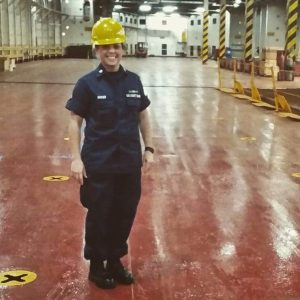DAVIE, Fla. — History has shown us that in times of crisis, there is strength in numbers.
Take the roles of UF/IFAS Extension Florida Sea Grant agents and the United States Coast Guard members for instance. As members of separate entities, they protect our shorelines, our waterways; they protect the delicate ecosystem of our oceans as separate entities.
After a natural disaster, UF/IFAS Extension Florida Sea Grant Agents assess the coastal damage and the effects on the marine species to ensure its livelihood. The U.S. Coast Guard serves in the recovery phase of a natural disaster to protect our waters. Each works with a variety of groups and organizations to ensure America enjoys a rich, diverse and sustainable ocean environment.
What if the two combined their forces?
Meet Caitlin Jenner Barker, 33, a marine science technician and safety officer for the United States Coast Guard.
 On any given day, Barker can be called to respond to a natural disaster that affects our waterways or environmentally sensitive areas. Last year, she responded to more than 1,000 pollution cases affecting waterways in Louisiana, ranging from barrels of crude oil spills to hurricane disaster recoveries.
On any given day, Barker can be called to respond to a natural disaster that affects our waterways or environmentally sensitive areas. Last year, she responded to more than 1,000 pollution cases affecting waterways in Louisiana, ranging from barrels of crude oil spills to hurricane disaster recoveries.
That’s been her day to day job for the last 13 years.
Over the summer, she embarked on a new assignment designed to bridge a gap between the two entities. She is stationed at the UF/IFAS Extension Broward County in Davie through a Marine Industry Mutual Training Agreement between the U.S. Coast Guard and UF/IFAS and Florida Sea Grant.
“My role is to increase the line of communication among the U.S. Coast Guard, UF/IFAS Extension, Florida Sea Grant and other county agencies from Palm Beach County south to Monroe County that will ultimately bridge the gap that exists when disaster strikes,” said Barker.
Florida Sea Grant professionals play a vital role, taking the best science-based solutions produced by Sea Grant researchers and making them understandable and useful to coastal residents, businesses and communities, added Barker.
“This requires an extreme level of expertise and understanding,” said Barker. “By identifying ways that agents can use their expertise to assist the US Coast Guard either before or after a hurricane, oil spill or other coastal disaster allows everyone to recover that much faster.”
Barker explains, the two entities have complementary specialties that can mutually benefit each of their roles as well as provide relief and protection to the waterways of the communities they serve when a natural disaster occurs.
“Florida Sea Grant Agents have specialty knowledge of waterway issues such as red tide and toxic spills, as well as expert knowledge of environmentally sensitive areas such as coral reefs and nesting areas where they are geographically assigned. Meanwhile, the U.S. Coast Guard is the waterway’s first responder with broad knowledge and the authority to assist in a case when laws need to be enforced when restoration or recovery needs to take place.”
Additionally, Barker sees the relationship as a way to work proactively with Florida Sea Grant Agents when conditions or environmentally sensitive areas need to be monitored.
“This is a two-way street for a collaboration that can serve as guardians of the waterways,” said Barker.
By aligning the resources of UF/IFAS Florida Sea Grant with the US Coast Guard, providing those additional troupes on the ground with Barker and the US Coast Guard, disaster recovery in other situations along the Florida Keys and of commercial fisheries could be assessed that much quicker.
“It is expertise and resources like these that will further enhance a structured disaster recovery system in the southeast. We can only be a stronger resource when disaster strikes.,” said Barker.
Other objectives Barker is fulfilling as part of her assignment include:
• Compiling a list of the Incident Command System (ICS) contacts in Florida who are responsible when there is a coastal disaster
• Developing educational opportunities that will familiarize UF/IFAS Extension Florida Sea Grant agents with ICS protocols;
Barker’s assignment will end in October at UF/IFAS but the objective will not. The connections will be put to work as she returns to her role as a marine science technician and safety officer at a new post in the Southeast Florida region covering Palm Beach, Broward, Dade and Monroe counties.
-30-
By: Lourdes Rodriguez, 954-577-6363 office, 954-242-8439 mobile, rodriguezl@ufl.edu
The mission of the University of Florida Institute of Food and Agricultural Sciences (UF/IFAS) is to develop knowledge relevant to agricultural, human, and natural resources and to make that knowledge available to sustain and enhance the quality of human life. With more than a dozen research facilities, 67 county Extension offices, and award-winning students and faculty in the UF College of Agricultural and Life Sciences, UF/IFAS brings science-based solutions to the state’s agricultural and natural resources industries and all Florida residents.
 0
0
